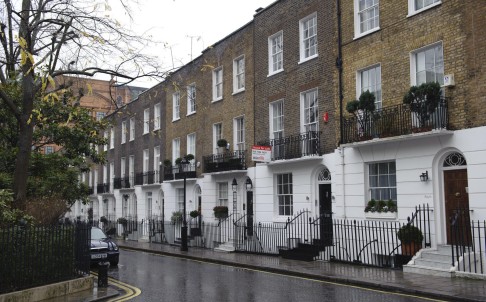People in HK tend to be more savvy than Singaporeans. In Singapore, we are taught to be obedient employees, saying yes to everything our bosses tell us to do. There's little room for creativity, analysis, or questioning. There's also little focus on debate and eloquence, which makes us even poorer communicators.
In the mid 1990s, Hong Kongers were buying a lot of London properties, right at the start of the 15 year boom. Singaporeans only realise overseas property investments in the last three years.
Hong Kong investors snap up older properties in London hotspots
Wealthy Hongkongers are among those buying to renovate and rent, or sell on to other Asians
Wednesday, 14 August, 2013, 4:03am
Kensington and Chelsea is one of the top areas. Photo: Bloomberg
Wealthy Hong Kong and mainland Chinese property investors are snapping up homes in London's second-hand market, buying multiple properties to improve, rent out, and sell on to other Asian buyers.
Guy Meacock, director at buyers' agency Prime Purchase, has helped a Chinese businesswoman buy seven central London properties. She has bought multimillion-pound flats with two or three bedrooms in London's most expensive boroughs - Westminster, and Kensington and Chelsea.
She buys Victorian homes mostly because they are better located than the majority of new developments, and where necessary she puts in new kitchens and bathrooms and makes other improvements, said Meacock.
Older properties tended to more popular with Britons and Europeans, the biggest source of demand in the resales and lettings markets.
Research by property consultancy Knight Frank shows most types of older property in Britain are sold at a premium. Georgian houses command 25 per cent over the price of the average house, whereas flats and houses built in the second half of the 20th century are typically 15 per cent less valuable than the average.
Meacock's biggest client invested across the two boroughs, including the Bloomsbury and Marylebone districts, where home prices may be boosted by Crossrail, a commuter line that will connect them and other parts of central London with towns east and west of the British capital when it opens in 2018.
Property consultancy GVA forecasts Crossrail will add £5.5 billion (HK$66 billion) to residential and commercial property values in locations along its route.
Meacock's client is banking on anticipated future capital appreciation to make a profit, not rental yields, which are only between 3 and 4 per cent in central London, according to Knight Frank. Older properties tend to require regular maintenance, which eats into returns.
Buyers' agency Black Brick is helping a Hong Kong entrepreneur find blocks of apartments valued at between £5 million and £10 million in Kensington and Chelsea. The cash buyer will either rent them out or refurbish them and re-sell to buyers in Asia.
Hong Kong investors must pay income tax on rental income, but no capital gains tax when they sell a property.
Robert Hadfield, managing director of investment property management company Pineflat, said there was merit in the approach taken by the investors if they wanted to build up a store of value, because there was a finite number of period homes available to own and tenant demand was holding up strongly.
But the strategy was speculative, said Hadfield, if it did not take into account income stream and was based on reselling already overpriced property at a higher price later on.
This article appeared in the South China Morning Post print edition as Investors snap up older homes in London hotspots
